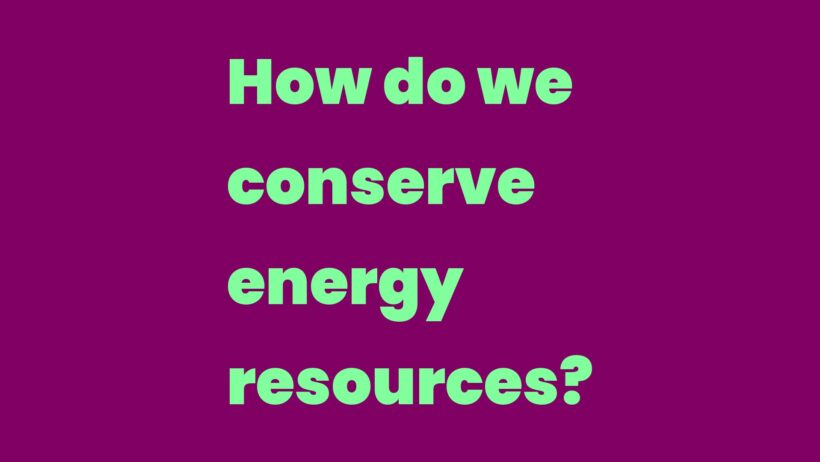As the planet grapples with the escalating challenges posed by climate change, conserving energy resources has emerged as a paramount concern. We find ourselves at a crucial juncture where the actions we take today can significantly impact future generations. This discourse comprehensively explores various strategies to conserve energy resources, delving into practical methodologies, benefits, and the wider implications for environmental sustainability.
Energy conservation encompasses a myriad of approaches aimed at reducing energy consumption without compromising the utility and comfort of our lives. This concept transcends the mere reduction of power expenditure; it advocates for a paradigm shift toward sustainable practices in both our personal and professional environments.
The Importance of Energy Conservation
To comprehend the gravity of energy conservation, it is imperative to acknowledge its multifaceted benefits. By conserving energy, we not only reduce greenhouse gas emissions but also mitigate the depletion of natural resources. The correlation between energy consumption and environmental degradation is evident, as a reduction in energy use directly correlates with decreased pollution levels and a lighter carbon footprint.
Moreover, the economic implications of conserving energy are significant. Lower energy consumption can lead to reduced utility bills for households and organizations alike, promoting fiscal prudence. As energy costs fluctuate, the need for stability becomes ever more pressing, making energy conservation a financially prudent strategy.
Practical Strategies for Energy Conservation
Several actionable strategies exist for individuals and organizations aiming to conserve energy. These strategies can be implemented across various sectors, including residential, commercial, and industrial settings.
1. Enhancing Energy Efficiency at Home
One of the most accessible avenues for energy conservation lies within our homes. Simple adjustments can yield profound results. For example, replacing incandescent bulbs with energy-efficient LED lights can significantly reduce energy consumption. LEDs consume up to 80% less electricity and possess a longer lifespan than traditional bulbs.
Additionally, optimizing heating and cooling systems plays a crucial role in energy conservation. Regular maintenance of HVAC systems, such as cleaning filters and sealing ducts, ensures they operate at peak efficiency. Installing programmable thermostats can also facilitate energy savings by automatically adjusting temperature settings based on occupancy patterns.
2. Adopting Renewable Energy Sources
The transition to renewable energy sources is not merely a trend; it represents a fundamental shift in how we produce and consume energy. Solar panels, wind turbines, and geothermal systems increasingly provide viable alternatives to fossil fuels. By harnessing these renewable resources, individuals can decrease their dependence on non-renewable energy, thus contributing to long-term sustainability.
Moreover, governmental incentives and subsidies can make adopting these technologies more accessible to the public. In essence, transitioning to renewable energy is not just environmentally sound but also economically advantageous.
3. Implementing Smart Technology
The advent of smart technology has revolutionized energy management. Smart meters and home automation systems enable real-time monitoring of energy consumption, empowering users to identify and rectify inefficiencies. Such technology allows homeowners to track their usage patterns and make informed decisions about when to utilize energy-intensive appliances.
Moreover, the integration of smart thermostats, energy management systems, and even smart appliances can lead to substantial energy savings. These innovations allow users to automate energy conservation measures, thereby ensuring their homes remain energy efficient without requiring constant oversight.
4. Behavioral Changes and Cultural Shift
Beyond technological advancements, fostering a culture of energy conservation is essential. Simple lifestyle modifications can lead to considerable collective impact. Practices such as turning off lights when leaving rooms, unplugging devices when not in use, and using energy-efficient modes on appliances contribute to reducing overall energy demand.
Furthermore, educational initiatives aimed at raising awareness about energy conservation are vital. Schools, community organizations, and local governments can collaborate to disseminate information about the ramifications of energy waste and the benefits of conservation. Encouraging environmentally responsible habits from a young age ensures that future generations are better equipped to tackle energy-related challenges.
The Broader Implications of Energy Conservation
The act of conserving energy extends beyond individual benefits; it has far-reaching implications for society as a whole. By reducing energy consumption, we diminish the strain on energy infrastructures and decrease the likelihood of blackouts and other disruptions. Communities that prioritize energy conservation can experience enhanced resilience and improved quality of life.
Additionally, energy conservation can significantly impact national and global energy policies. As nations transition towards sustainable development goals, the collective efforts of individuals and organizations in conserving energy can influence governmental strategies and foster international collaboration on climate issues.
Conclusion
In summation, the preservation of energy resources stands as a crucial element in the fight against climate change. By implementing practical strategies such as enhancing energy efficiency, adopting renewable sources, utilizing smart technology, and advocating for cultural shifts, individuals and organizations can contribute meaningfully to the conservation of our planet’s energy resources. The journey toward sustainability may be intricate, but the indelible benefits it offers to our environment, economy, and society at large are undeniable. It is our collective responsibility to champion these efforts, ensuring a healthier planet for ourselves and future generations.








